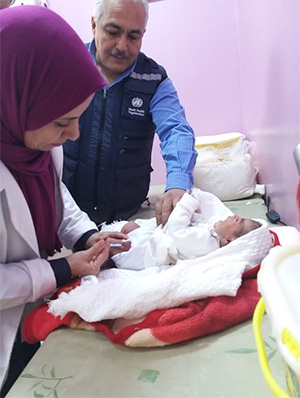Joint WHO/UNICEF press release
 Tripoli, 18 May 2020 - The lives and health of over a quarter of a million children under one year of age in Libya are at risk from vaccine-preventable diseases due to critical shortages in vaccine supplies.
Tripoli, 18 May 2020 - The lives and health of over a quarter of a million children under one year of age in Libya are at risk from vaccine-preventable diseases due to critical shortages in vaccine supplies.
UNICEF and WHO are raising the alarm over severe vaccine shortages in Libya that are putting more than 250,000 children at severe risk. The situation is made worse by the continued armed conflict, the COVID-19 pandemic, disrupted health care services, regular power cuts, shortages of safe water supplies and the closure of schools and child-friendly spaces.
For the past two months, access to routine immunization services has been disrupted as a result of the COVID-19 lockdown, leading to an increased risk of a resurgence of measles and polio outbreaks. There are acute shortages of hexavalent vaccine, which protects against six diseases (diphtheria, tetanus, pertussis, poliomyelitis, haemophilus influenzae type b and viral hepatitis B). Similarly, oral polio vaccine, which is administered at birth and at nine months of age, is in critically short supply. Children in hard-to-reach and conflict-affected areas are at particular risk because they may have already missed some vaccination doses. WHO and UNICEF are also concerned that many migrant, refugee or internally displaced children may not have received their basic vaccination doses in their country of origin or may have missed the required doses in Libya.
Procurement orders for essential vaccines have been delayed because of lengthy governmental approval processes. Libya’s Expanded Programme on Immunization (EPI) was disrupted due to vaccine stockouts in 2019. With a saturated global supply chain and constraints arising from the COVID-19 pandemic, the country is likely to face an extended stockout for a second year running.
“Immunization is one of the most effective public health interventions and when routine vaccinations are missed, there is a high chance of a resurgence of a measles outbreak, other preventable diseases, and fatalities among the children”, said Mr Abdel-Rahman Ghandour, UNICEF Special Representative. “There is an urgent need to ensure an uninterrupted flow of funds for vaccine procurement to cater for the current shortfall. UNICEF renews offering its procurement services to the Government of Libya to procure WHO prequalified vaccines at competitive prices and have them delivered to Libya urgently ”,.
“WHO has successfully advocated with the health authorities for the continuation of the EPI during the COVID-19 pandemic”, said Ms Elizabeth Hoff, WHO Representative in Libya. “Although we have overcome that hurdle, we face far more serious obstacles if the vaccine supply dries up. This will place the lives of hundreds of thousands of children in Libya at risk. WHO stands with UNICEF in offering its full support to the Government of Libya to address this critical challenge.”
About UNICEF
UNICEF promotes the rights and wellbeing of every child in everything we do. Together with our partners, we work in some of the toughest places in the world and across 190 countries and territories to translate that commitment into practical action, with a special focus on reaching the most vulnerable and excluded children everywhere.
Follow UNICEF on Twitter and Facebook. For more information about COVID-19 and guidance on how to protect children and families, visit www.unicef.org/coronavirus
About WHO
Under its vision of Universal Health Coverage and the right to health care for all people, everywhere, WHO works worldwide to promote health, keep the world safe, and serve the vulnerable. Its goal is to ensure that a billion more people have universal health coverage, to protect a billion more people from health emergencies, and provide a further billion people with better health and well-being.
Follow WHO on Twitter and Facebook and get acccess to comprehensive resources on COVID here.


